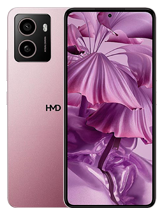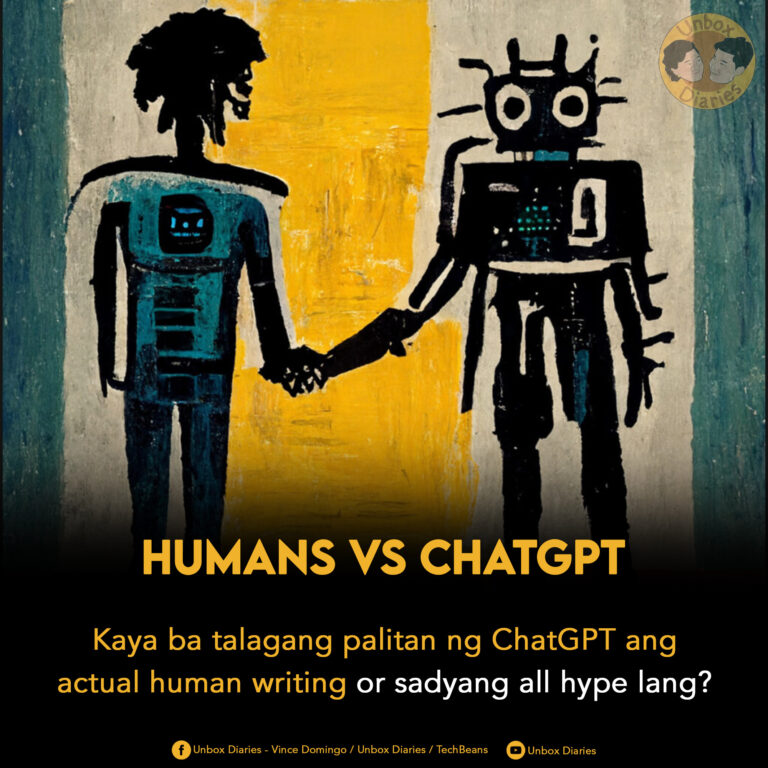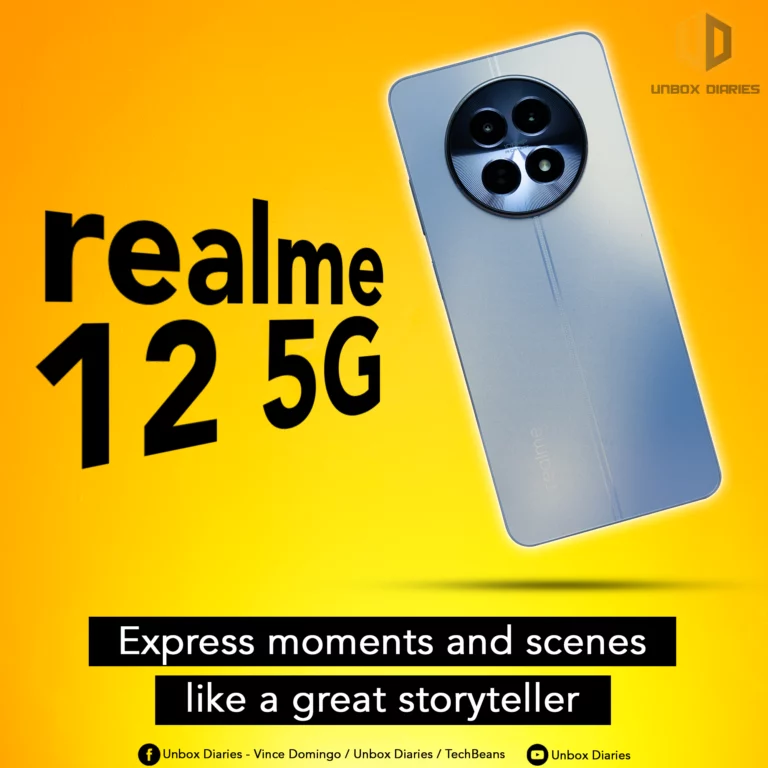There’s an ongoing debate today whether ChatGPT can replace human writers as we know it for research, assignments, fiction, and everything. Short answer: no.
This article is written with the help of ChatGPT (its words will be highlighted in red to differentiate it from actual human writing).
Since ChatGPT’s release into the internet wild west, more and more people are benefitted from this “all-knowing” artificial intelligence program and testimonies from users.

They said that ChatGPT helped them with doing their homework, restaurant menus, a better resignation letter, presentations, and many more applications. And we won’t deny, ChatGPT is great at creating this type of writing.
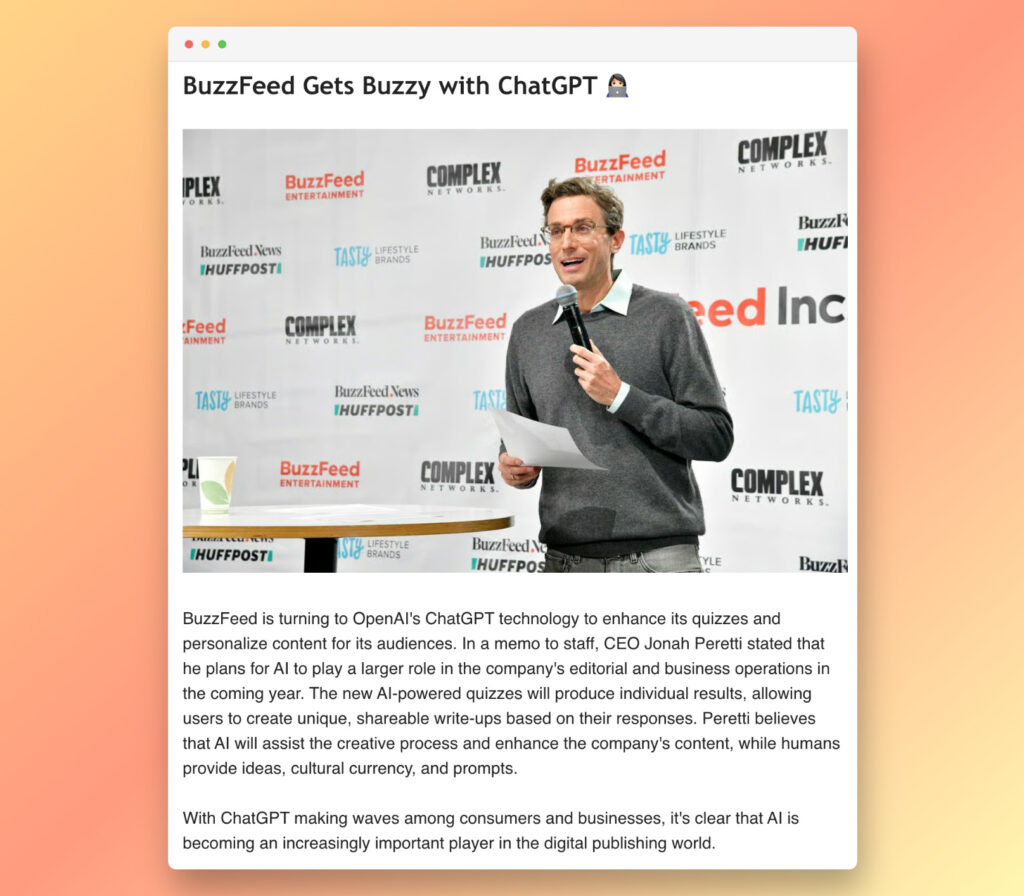
But when the corporate overlords get to see another reason to automate things to generate the most amount of cash with the least effort? There lies a problem.
Yes, it is possible to hire some guy to inject a sense of “monotonous human touch” into what ChatGPT churns out, and maybe hopefully– your typical lazy consumer who doesn’t bother to even read and digest each word won’t know it.

AI-generated music, AI-generated artwork, and now AI-generated writing: it may democratize these art forms, but the truth is, it will not replace real, genuine human-made art.
Now, let’s see what ChatGPT has to offer about this very topic here with the prompt:
[Write me a lengthy article about five reasons why ChatGPT will not replace actual human writing anytime soon]

As an AI language model, ChatGPT has shown impressive capabilities in generating text that is coherent, relevant, and informative. However, despite the significant advancements made in the field of natural language processing, it is unlikely that ChatGPT will replace actual human writing anytime soon. In this article, we will explore five reasons why this is the case.
ChatGPT is a real robot piece here: nonchalantly dissing itself with a prompt, with no reaction and pure, sterile reaction. Is this what we want to do for our homework and whatnot? If it is, it’s only a matter of time before AI detection software steps up to the game and shatters your automated dreams. Let’s continue.
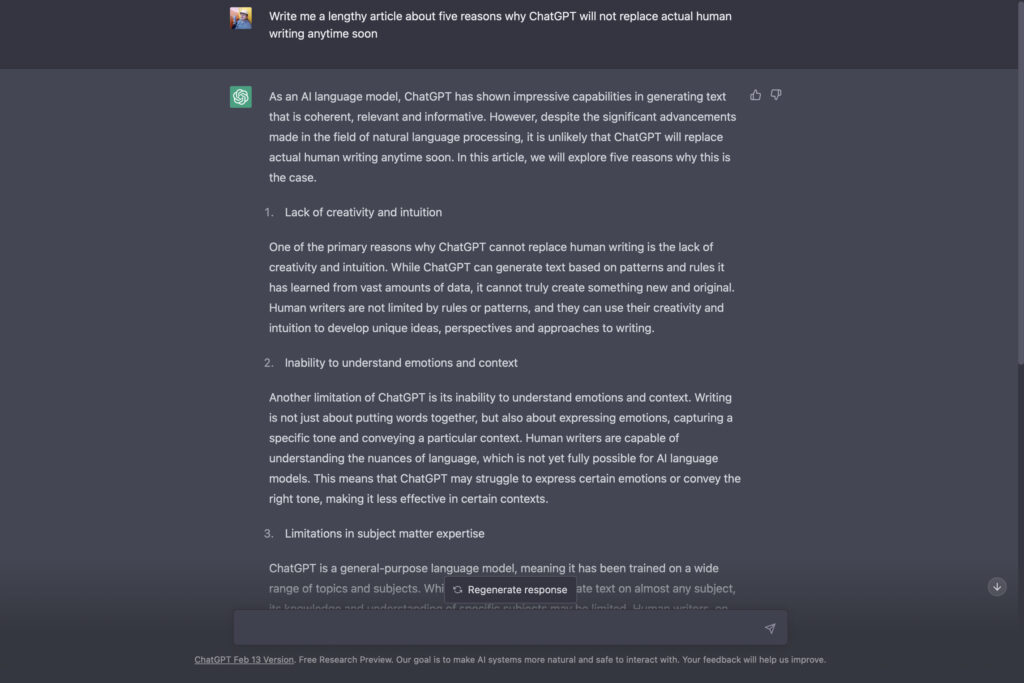
Lack of creativity and intuition
One of the primary reasons why ChatGPT cannot replace human writing is the lack of creativity and intuition. While ChatGPT can generate text based on patterns and rules it has learned from vast amounts of data, it cannot truly create something new and original.
Human writers are not limited by rules or patterns, and they can use their creativity and intuition to develop unique ideas, perspectives, and approaches to writing.
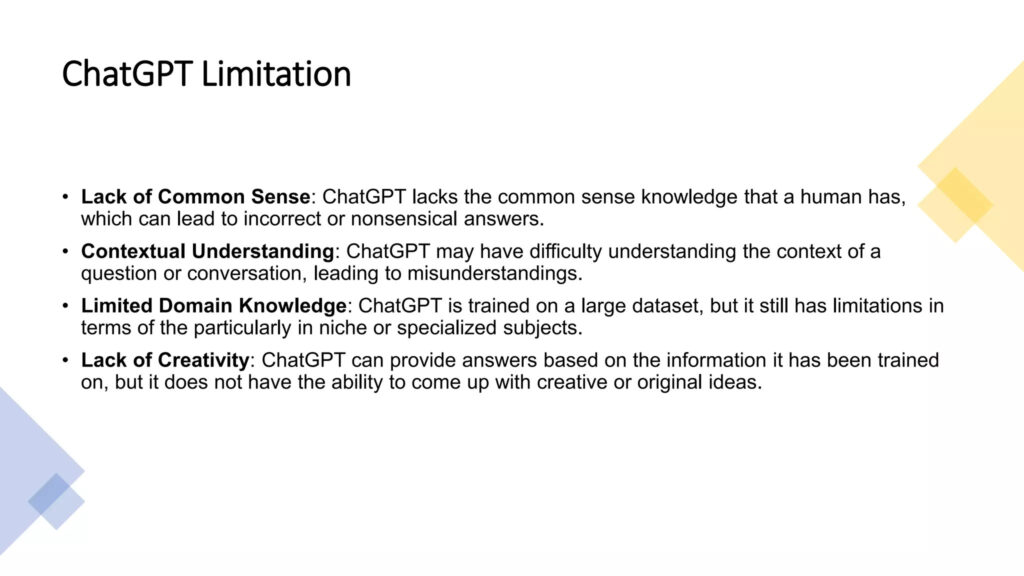
The actual writing is really hard, and if you chance upon reading a three-minute read that’s smooth and engaging– that’s equal to a couple of hours of hard, grueling writing. Back-and-forth proofreading, rewrites, and tons of research, and still– an error or two might slip up.
Even the Hemingways, Leonards, and Bob Ongs of the world aren’t immune to mistakes, and that’s what makes human writing special. The fragility, openness, humanness, and subtle writing beats that only a human can create and detect are something ChatGPT can’t reproduce. Not in a million years.
Even if the guy who was hired to makeover ChatGPT’s answers may still not be good as actual human writing.
Inability to understand emotions and context
Another limitation of ChatGPT is its inability to understand emotions and context. Writing is not just about putting words together, but also about expressing emotions, capturing a specific tone, and conveying a particular context.
Human writers are capable of understanding the nuances of language, which is not yet fully possible for AI language models. This means that ChatGPT may struggle to express certain emotions or convey the right tone, making it less effective in certain contexts.

ChatGPT is capable of saying any information in an organized manner, but apart from all that– it can’t be compared to the actual person writing something. AI is advanced now in Google-esque turnover of information, but there’s a reason why sites like Wikipedia exist– written by volunteer contributors and not ChatGPT because it is bland and only good for generating ideas.
But there are some advantages to ChatGPT as well: the ability to provide information non-stop without stopping. Compared to a human writer, we are only capable of writing around a couple of topics each day, with varying levels of complexity.
Lucky if that person can churn out a lot more, but there are risks of burnout which leads to a decline in quality. ChatGPT is in the rescue but still, there’s something off in ChatGPT’s writing that until today, it’s only a last-ditch option for writers out there.
But still, it’s not endorsed or encouraged because that’s just lazy for the writer and predatory to whatever company relying upon automation yet again instead of giving that chance to someone who can actually write with panache and creativity.
Limitations in subject matter expertise
ChatGPT is a general-purpose language model, meaning it has been trained on a wide range of topics and subjects. While it may be able to generate text on almost any subject, its knowledge and understanding of specific subjects may be limited.
Human writers, on the other hand, can have deep subject matter expertise, allowing them to provide in-depth analysis and insights that are not possible for ChatGPT.

ChatGPT is practically an outdated Wikipedia-like AI-based information source, meaning it cannot go hand-in-hand with up-to-date information since it needed to be ‘studied’ and uploaded to ChatGPT’s ‘brain’. Whereas human writers are more likely to be updated, well-versed, and have a deep understanding of a particular topic.
But sometimes, if you’re a journalist for example you need to deliver the news as quickly as possible. You need to sacrifice creativity for speed. Quantity over quality writing that is well thought-out and with carefully selected words. You don’t have the privilege to do that. You need to be monotonous, you need to be unemotional to deliver the goods.
Ever wonder why Mel Tiangco, Mike Enriquez, or any new anchor and reporters didn’t have their personal touch or opinions or the news they’re telling us? It’s because that is news, any instance of personal input is added, and the risk of muddling the content is really high.

There is no time for flair and personal touch when the name of the game is to “deliver the content as quickly as possible.” But let us tell you something, our valuable reader: it takes time to write quality content. There are no shortcuts, but what we would give for that shortcut to exist, right? And ChatGPT isn’t fit to wear that description.
Lack of personal touch
One of the most significant advantages of human writing is the personal touch that it can provide. Human writers can inject their personality, voice, and style into their writing, which makes it more engaging and relatable for the reader.
ChatGPT, on the other hand, is limited to generating text based on pre-defined rules and patterns, which can make it sound robotic and impersonal.
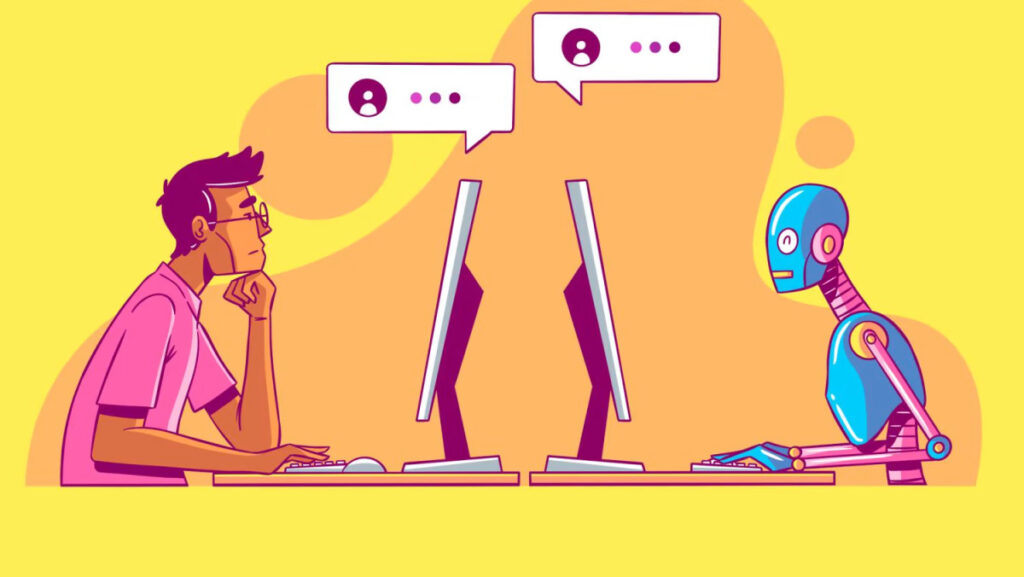
What makes good writing? Having a personal touch, and your own writing voice is essential to the overall human experience as writers and artists pull off from a combination of personal stories, frustrations, happiness, sadness, and everything that makes a human, well…human.
If you’re the kind of person who always looks for the bestsellers, the highest-grossing book, or the most-viewed articles offline and online, then you’re missing the point. One aspect is keeping your market happy since writing without profit is not only delusional but not ideal in the grand scheme of things.
\On the other hand, if you only focus on thinking if this particular writing cuts straight to the point and if it’s consumable without too much brain power needed, then maybe you’re the kind of person who finds ChatGPT’s ‘writing’ preferable and maybe a tad bit ignorant of the journey of reading a fine piece of writing, which is never a straight piece of road, but a maze inside a garden of the hedge maze, inside another maze.
Difficulty in maintaining coherence and consistency
While ChatGPT can generate text that is coherent and consistent in terms of grammar and syntax, it may struggle to maintain coherence and consistency in terms of ideas and arguments.
Human writers can use their creativity and intuition to ensure that their writing flows smoothly and that their ideas are presented in a logical and compelling way. ChatGPT, however, may struggle to maintain the same level of coherence and consistency, making it less effective in some writing contexts.

There’s a popular saying goes that a “jack of all trades is master of none”. Which rings kinda true. We have no match against ChatGPT’s extensive knowledge of the whole of human history. But an artist’s edge is maintaining a great narrative, coherence, and overall consistency when it comes to writing a piece such as this, something like ChatGPT cannot reproduce since it only knows surface-level information for the most part.
Conclusion
In conclusion, while ChatGPT has made significant advancements in the field of natural language processing, it is unlikely to replace human writing anytime soon. The limitations in creativity, intuition, emotional understanding, subject matter expertise, personal touch, and coherence make it less effective in certain writing contexts.
However, ChatGPT and other AI language models can still be valuable tools for human writers, helping them to automate certain tasks and generate ideas and inspiration for their writing.
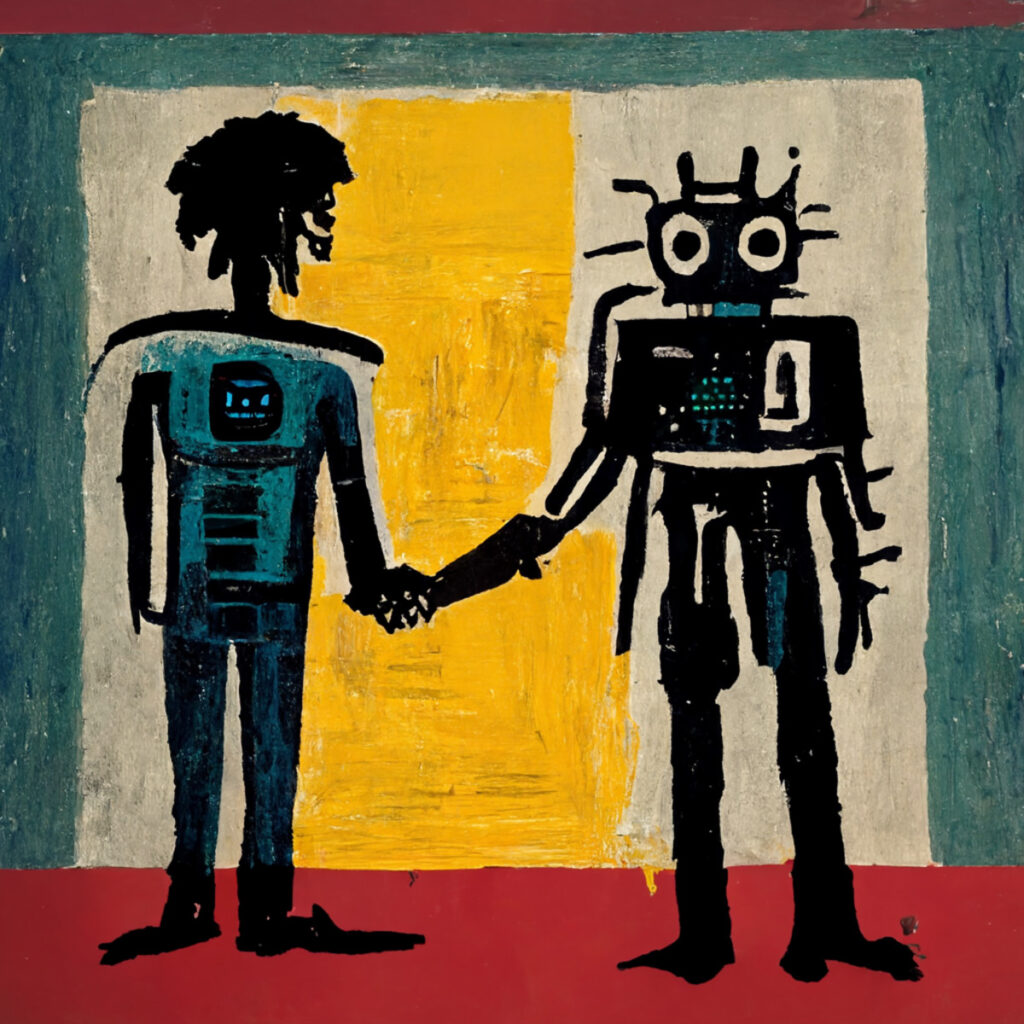
It’s no secret that ChatGPT made so many people’s lives easier– but we need to understand that only we humans can push modernity and innovations for the next era of mankind’s endeavors into art and society as a whole, and replacing people with robots not only cements the dystopian nightmare many philosophers are fearing about, but it also speaks volumes about a person’s character towards this very subject.

